PromptFolder is a Chrome extension designed to streamline the management of prompts for AI tools like ChatGPT and Midjourney. It offers a comprehensive solution for saving, sharing, and discovering prompts, enhancing user productivity and creativity in AI interactions. With features like prompt organization, customization, and community sharing, PromptFolder caters to both individual users and collaborative teams seeking to optimize their AI prompt workflows.
PromptFolder - ChatGPT Prompt Manager
Save, share, and discover prompts for ChatGPT, Midjourney, and other AI tools.
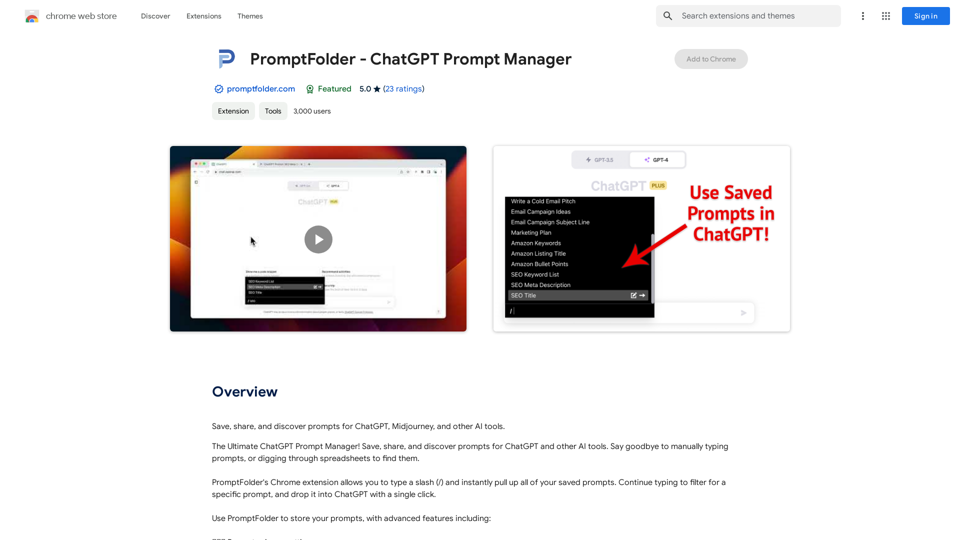
Introduction
Feature
Efficient Prompt Management
- Save prompts for future use
- Organize prompts into folders
- Search functionality for quick prompt retrieval
Seamless Integration
- Type "/" to instantly access saved prompts
- Filter and drop prompts into ChatGPT with a single click
- Compatible with various AI tools (ChatGPT, Midjourney, etc.)
Customization and Flexibility
- Use variables and comments to customize prompts
- Access prompts from any device
Community and Collaboration
- Share prompts with others
- Discover new prompts from the community
- Explore community section for ideas and inspiration
User-Friendly Interface
- Chrome extension for easy access
- Intuitive prompt organization system
Versatile Pricing Options
- Free version with limited features
- Paid subscription with additional features and benefits
FAQ
How does PromptFolder enhance productivity?
PromptFolder boosts productivity by:
- Saving time on manual prompt typing
- Providing quick access to a library of prompts
- Reducing errors through customization features
- Facilitating collaboration and idea sharing
What are some best practices for using PromptFolder?
Tips for maximizing PromptFolder's potential:
- Utilize folders for organized prompt management
- Leverage variables and comments for prompt customization
- Actively share and collaborate on prompts
- Explore the community section for new ideas
- Use the search function for efficient prompt retrieval
Is PromptFolder suitable for team use?
Yes, PromptFolder supports team collaboration by:
- Allowing prompt sharing among team members
- Providing a platform for discovering and adapting shared prompts
- Enabling consistent prompt usage across the team
Related Websites
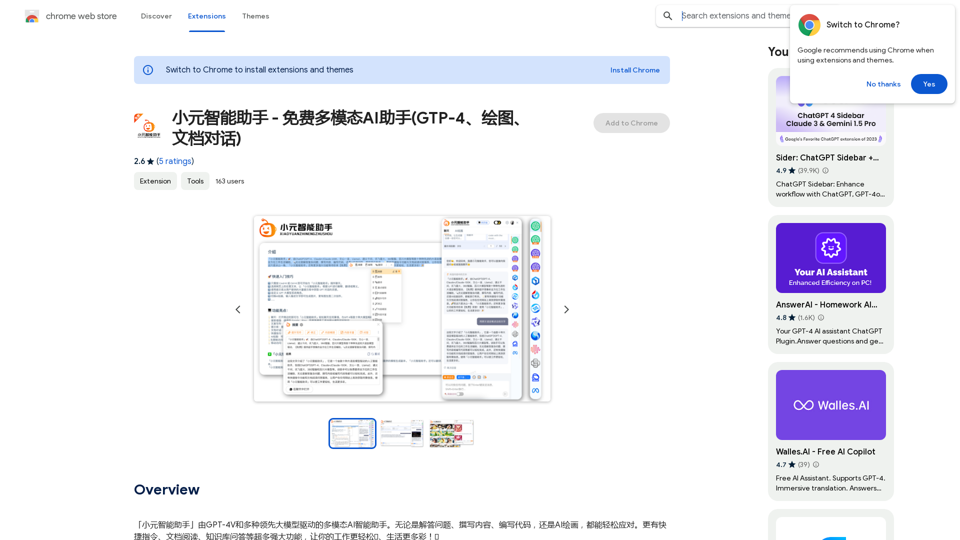
Xiao Yuan Intelligent Assistant - Free Multimodal AI Assistant (GTP-4, Drawing, Document Chat)
Xiao Yuan Intelligent Assistant - Free Multimodal AI Assistant (GTP-4, Drawing, Document Chat)"Xiao Yuan AI Assistant" is a multi-modal AI assistant powered by GPT-4V and several leading large models. Whether it's answering questions, writing content, writing code, or AI painting, it can handle it with ease. It also has many powerful features like quick commands, document reading, and knowledge base Q&A, making your work easier🌈 and life more colorful! 🎉
193.90 M
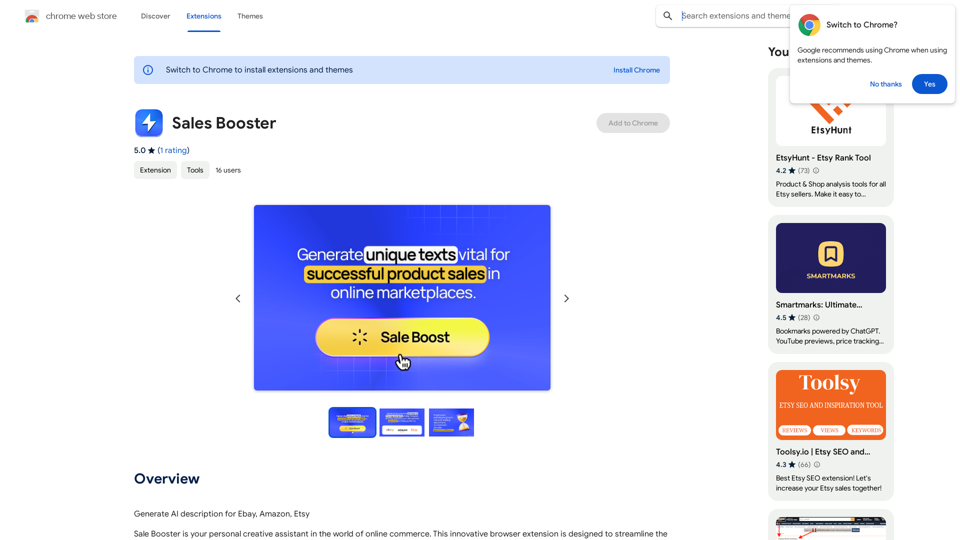
AI Descriptions for Online Marketplaces: eBay: * The global marketplace where anyone can buy and sell almost anything. Discover unique items, bid on auctions, and find great deals from individuals and businesses worldwide. Amazon: * Your one-stop shop for millions of products, from everyday essentials to the latest gadgets. Enjoy fast shipping, convenient shopping, and a vast selection across all categories. Etsy: * A vibrant community of creative entrepreneurs selling handmade, vintage, and unique goods. Find one-of-a-kind treasures, support small businesses, and discover unique gifts for every occasion.
193.90 M
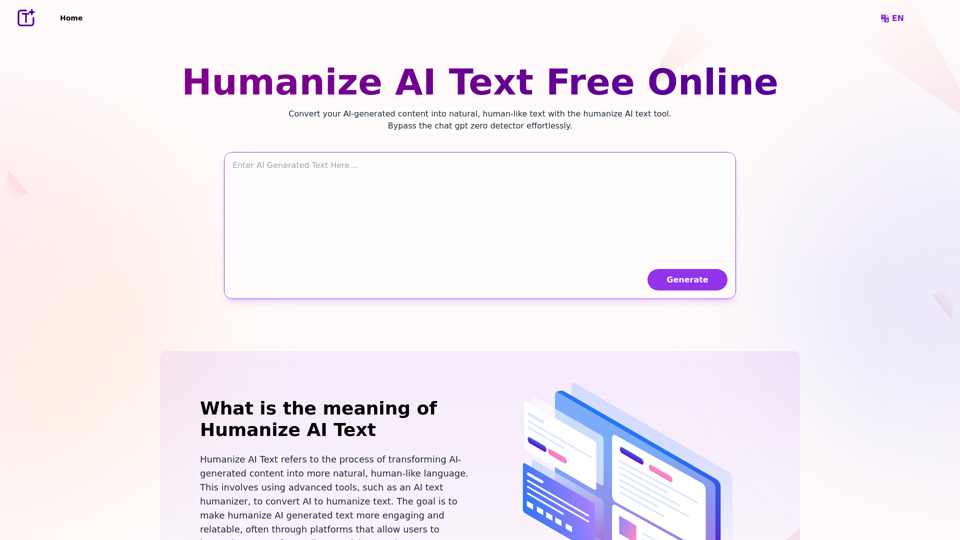
Experience the power of our AI text humanizer to convert AI text into human-like text effortlessly. Humanize AI text for free online to create engaging and undetectable content. Perfect for humanizing AI text from ChatGPT.
337.20 K

Universal Listening Comprehension - Speech-to-Text, Bilingual Subtitle Translation
Universal Listening Comprehension - Speech-to-Text, Bilingual Subtitle TranslationAlibaba's free large model application, real-time speech recognition, AI subtitle translation, and intelligent summarization. Essential for online courses, chasing dramas, and online meetings. Record, transcribe, translate, and summarize online courses and meetings from any web page.
193.90 M
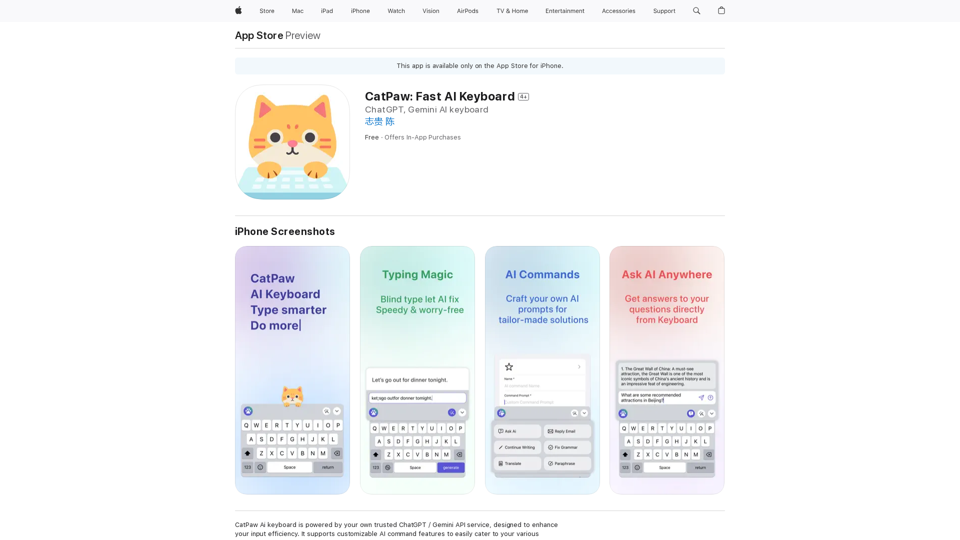
The CatPaw Ai keyboard is powered by your own trusted ChatGPT / Gemini API service, designed to enhance your input efficiency. It supports customizable AI commands for a more personalized experience.
124.77 M
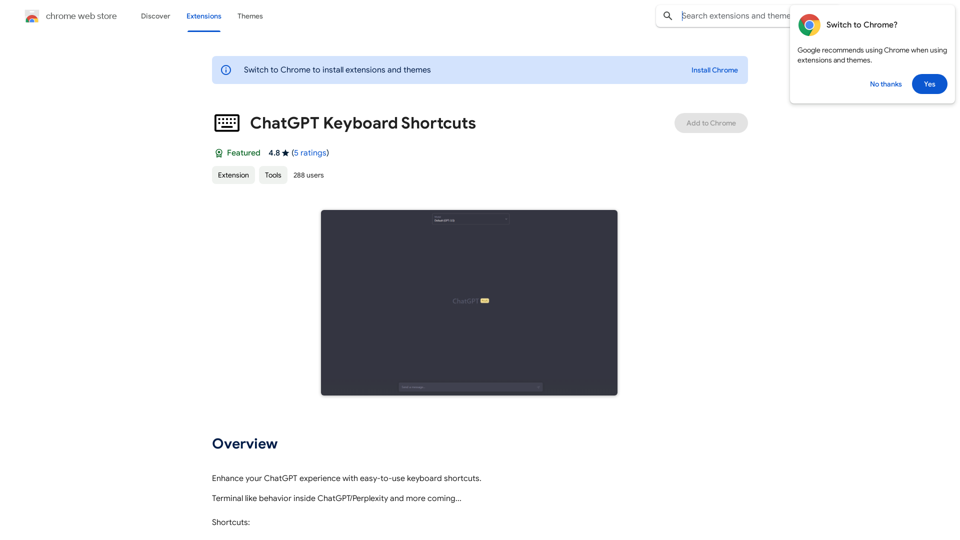
ChatGPT Keyboard Shortcuts #Navigation * Ctrl + →: Move to the next message * Ctrl + ←: Move to the previous message * Home: Move to the beginning of the conversation * End: Move to the end of the conversation #Editing * Ctrl + A: Select all text * Ctrl + C: Copy selected text * Ctrl + X: Cut selected text * Ctrl + V: Paste copied or cut text * Ctrl + Z: Undo * Ctrl + Y: Redo * Ctrl + Shift + F: Format text as code #Actions * Enter: Send the message * Shift + Enter: Insert a new line * Ctrl + Shift + Enter: Send the message and insert a new line * Esc: Cancel editing and close the message input field * Ctrl + Shift + Space: Open the emoji picker * Ctrl + Shift + /: Open the help menu #Accessibility * Ctrl + +: Increase font size * Ctrl + -: Decrease font size * Ctrl + 0: Reset font size to default
ChatGPT Keyboard Shortcuts #Navigation * Ctrl + →: Move to the next message * Ctrl + ←: Move to the previous message * Home: Move to the beginning of the conversation * End: Move to the end of the conversation #Editing * Ctrl + A: Select all text * Ctrl + C: Copy selected text * Ctrl + X: Cut selected text * Ctrl + V: Paste copied or cut text * Ctrl + Z: Undo * Ctrl + Y: Redo * Ctrl + Shift + F: Format text as code #Actions * Enter: Send the message * Shift + Enter: Insert a new line * Ctrl + Shift + Enter: Send the message and insert a new line * Esc: Cancel editing and close the message input field * Ctrl + Shift + Space: Open the emoji picker * Ctrl + Shift + /: Open the help menu #Accessibility * Ctrl + +: Increase font size * Ctrl + -: Decrease font size * Ctrl + 0: Reset font size to defaultEnhance your ChatGPT experience with easy-to-use keyboard shortcuts.
193.90 M
